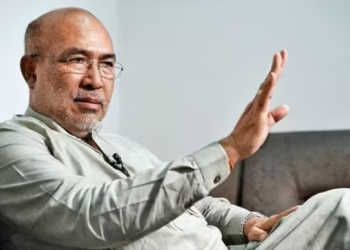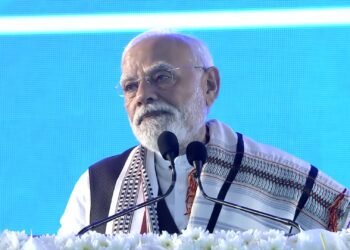As Aung San Suu Kyi remains imprisoned in Myanmar, her son Kim Aris intensifies efforts to secure her freedom, stressing the importance of her role in the country’s future. With her arrest seen as a blow to Myanmar’s democracy, Aris vows to keep fighting for her release and for the freedom of the Burmese people.
BY PC Bureau
On the fourth anniversary of her arrest, Aung San Suu Kyi’s son, Kim Aris, made a heartfelt plea to Myanmar’s military junta, urging them to release his mother from solitary confinement. The 79-year-old Nobel Peace laureate, who once symbolized democracy and resistance, has been detained since the military coup on February 1, 2021.
Speaking to The Independent, Aris described her imprisonment as “deeply painful” but emphasized that the issue transcends his family. “She is the last flame of hope for peace and democracy. The flame must not be allowed to be snuffed out,” he said.
Aris, who was raised in the United Kingdom, personally delivered a letter to the Myanmar embassy in London, appealing for his mother’s release. Despite knocking on the embassy door, he received no response and had to post the letter. A man arriving shortly afterward was swiftly allowed entry, underscoring the embassy’s refusal to engage with Suu Kyi’s family or supporters.
On 4th year of #Myanmarcoup, #AungSanSuuKyi‘s son #KimAris again calls for his mother’s release. Been a year since he last heard from her. The 80-year-old’s health weighs heavily on his mind. More of my conversation with Kim: https://t.co/CuthHbl56O #WhatsHappeningInMyanmar pic.twitter.com/Slx1UPWfxw
— May Wong (@MayWongCNA) February 1, 2025
Kim Aris: A Life of Separation and Resilience
Kim Aris, now in his forties, is the younger son of Aung San Suu Kyi and her late British husband, Michael Aris, a renowned Tibetan scholar and Oxford academic. Born and raised in the UK alongside his older brother Alexander, Kim led much of his life away from his mother due to her prolonged house arrest in Myanmar.
Despite the physical separation, Aris maintained a strong bond with his mother, often traveling to Myanmar under strict government surveillance. His childhood was marked by periods when he could not see her, even as she became a global icon for democracy. In a particularly painful episode, Aris’s father was denied entry to Myanmar while dying of cancer, depriving the family of a final reunion.
Aris has largely kept a low profile, choosing a private life in contrast to his mother’s political prominence. However, in recent years, he has become more vocal, particularly after the 2021 military coup that led to his mother’s imprisonment.
Daw Aung San Suu Kyi’s son-Kim’s letter addressed to junta leader Min Aung Hlaing to allow him to meet his mother.
Today marks 4th Anniversary of military coup in Myanmar, 3.5 millions of people internally displaced, 6000 lost their lives, junta continues airstrikes on people. pic.twitter.com/Mhcogx5Zxr— Htar Thakhin (@htartha76128693) February 1, 2025
Renewed Calls for Freedom
Aris’s plea coincided with the release of Independent TV’s documentary Cancelled: The Rise and Fall of Aung San Suu Kyi, which reignited calls for her freedom from prominent British politicians, including former foreign secretaries William Hague, Sir Malcolm Rifkind, and Jack Straw. They condemned her detention on “trumped-up” charges designed to silence her and dismantle democratic governance in Myanmar.
ALSO READ: PLA militant buried with fanfare in Imphal, police looks the other way
The Independent reported that Foreign Secretary David Lammy also intervened on the coup anniversary, demanding Suu Kyi’s immediate release.
“For the military junta in Burma to hold a frail 79-year-old woman in solitary confinement for daring to ask for her country’s freedom is not just wrong — as her son, it is also deeply painful,” Aris said.
He pledged never to stop advocating for her release: “I will never stop fighting for her after her appalling treatment by a regime that used fabricated charges to deny her a second term in office and prevent her from participating in democratic elections.”
A Complex Legacy
Aung San Suu Kyi’s journey from democracy icon to global pariah has been tumultuous. She rose to fame in the late 1980s as a symbol of resistance against military rule in Myanmar, drawing international admiration. However, her reputation suffered a severe blow in 2019 when she defended Myanmar at the International Court of Justice against allegations of genocide involving the Rohingya Muslim minority.
Despite the controversy, her supporters argue that her current imprisonment is politically motivated and unjust. Suu Kyi, who studied at Oxford and raised her two sons, Kim and Alexander, in the UK, returned to Myanmar in 1988 to care for her ailing mother. She became a central figure in the pro-democracy movement, spending nearly 15 of the 21 years between 1989 and 2010 under house arrest.
In 2015, Suu Kyi became the de facto leader of Myanmar, though the military retained control of key ministries and the defense budget. Her political downfall came with the military coup in 2021, plunging the country into chaos and conflict.
Aris highlighted the personal sacrifices endured by his family: “My grandfather was assassinated fighting for freedom. My father was not allowed to see my mother when he was dying of cancer. My brother and I have had long spells without seeing our mother. But this is beyond our family pain.”
He added, “She is the last flame of hope for peace and democracy in Burma. She must be freed. The flame must not be allowed to be snuffed out.”
Support from Activists and Politicians
After the screening of Cancelled: The Rise and Fall of Aung San Suu Kyi, human rights campaigner Bianca Jagger voiced her support: “The most difficult issue is for people to have mercy on fallen heroes. She was a hero for many of us, including me. We must do everything we can to see her released.”
Helena Kennedy, one of Britain’s most distinguished legal experts, has been quoted as saying, “She may have made some miscalculations along the way, but the world needs to reflect on what she was seeking to achieve. I think she believed she was preventing the inevitable coup that did in fact take place.”
As Myanmar remains mired in political unrest, Aris’ heartfelt plea serves as a reminder of the ongoing struggle for democracy and the enduring impact of a woman who once embodied hope for an entire nation.













